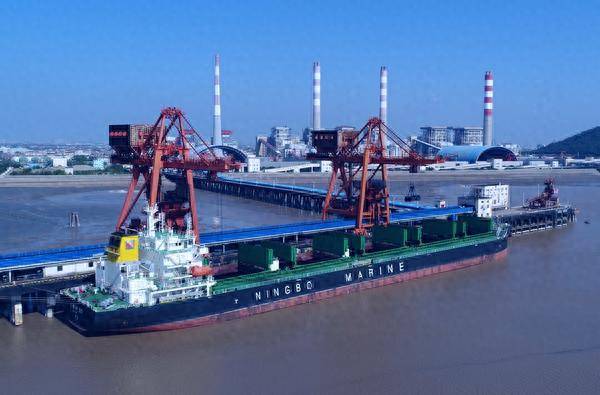Investing Over $1.1 Billion to Enter Shipbuilding Industry
China's shipping industry is often characterized by its rapid developments juxtaposed with the challenges of oversupply and fluctuating international markets. Yet, in this complex landscape, Ningbo Marine Corporation, one of the prominent players, has made a bold move—announcing an investment exceeding 1.1 billion yuan (approximately $166 million) to build new bulk carriers. This decision comes at a time when many in the industry have raised concerns about domestic overcapacity and international uncertainties.
In a recent statement, Ningbo Marine confirmed that it has entered into a construction contract with Jiangsu Hengtong Ocean Engineering Equipment Co., Ltd. for four 64,000-ton bulk carriers. This sizable investment raises questions among investors about the source of the substantial funds required for this endeavor, especially considering that, as of the end of September 2024, the company had roughly 500 million yuan in liquid assets, indicating a considerable funding gap of over 600 million yuan for the project.
Advertisement
Ningbo Marine has assured stakeholders that it plans to secure the necessary funding through a combination of internal resources and financing options. The company's spokesperson explained that the decision aligns with the company's strategic direction and has undergone thorough regulatory review. As of the third quarter, the company reported an impressively low debt ratio of 21.32% and positive cash flow, reflecting a generally healthy financial status.
Despite acknowledging that the domestic shipping capacity will continue to face pressure in the second half of the year, Ningbo Marine remains optimistic about its long-term prospects and the anticipated delivery of the new vessels. The company's half-year report outlined an expectation for increased deliveries of coastal bulk carriers, raising concerns over potential market oversupply. On the international front, while the dry bulk shipping market may soften slightly compared to the first half of the year, the company forecasts an overall improvement by the end of the year, suggesting a continuing increase in global dry bulk capacity.
The delivery timeline for the newly ordered ships is set for 2027, with specific milestones laid out in the contract signalling a disciplined approach to project management. The first vessel is expected to be delivered by the end of August that year, followed by others before the year's conclusion. This strategic investment aims to enhance the company's ability to cater to both domestic and international shipping demands flexibly.
The new vessels will be classified as super handy bulk carriers, designed to improve the company’s international shipping capabilities. Currently, Ningbo Marine operates a fleet of 31 vessels, a fleet which includes 26 handy bulk carriers, but has expressed the need to modernize and diversify its fleet with additional versatile options that can operate in different markets.
Market conditions present an interesting backdrop to this development. Competitors are also actively expanding their fleets—CMA CGM, for example, made headlines with an aggressive order for 72 new vessels within a span of four months. Such industry movements indicate that often, decisions are made in a context of market competitiveness—a reality that Ningbo Marine cannot ignore as it charts its future path.
To manage the hefty financial commitment associated with these new vessels, Ningbo Marine will execute payments in six installments. Notably, there is a clever '2+2' construction model being employed, allowing for a proactive evaluation of market conditions concerning the remaining two vessels. This flexibility could prove invaluable in a rapidly shifting global trade environment.
Questions from investors regarding discrepancies between the announced total investment and the bid awarded to Jiangsu Hengtong, which came in lower, indicate a level of scrutiny that enterprises need to adapt to. The responses from the company lacked direct engagement with these concerns, although they confirmed no further investment plans were on the horizon.
This entire endeavor is predicated on a backdrop of financial cautiously optimistic ledgers. While overseas revenue has seen growth, domestic market pressures have pushed the company into what can be described as reversed profitability; they recorded a loss during an otherwise lucrative global shipping climate. Reports reveal that Ningbo Marine’s revenue for the first three quarters of the year fell to 1.667 billion yuan, a decline of nearly 1% compared to the previous year, reflecting a stark contrast to the overall industry growth.

The narrative of declining profits and reduced gross margins has been a subject of annual reports. Even with significant international demand reviving and improved shipping season expectations due to inventory holding corrections, Ningbo Marine's results have illustrated vulnerabilities. This is considerably poignant when juxtaposed against an upward trending efficiency in transport revenues from peers in the same shipping category.
Firmly rooted within the sector's climate, Ningbo Marine primarily focuses on domestic coastal routes and international shipping, handling both raw materials and finished petroleum products. Shipping routes span a wide geographical area, from the north to major consumption regions alongside the Yangtze River and beyond. In recent disclosures, the company has positioned itself strategically for key coal supply routes originating from Australia and Indonesia—further aiming to capitalize on shifting consumer demand in a post-pandemic world.
The decision to enhance its fleet with additional vessels is not just a matter of numbers—it speaks to a broader desire to maintain competitive positioning, foster an agile supply chain, and rise to the challenges ahead spotted by market analysts. This analysis moves beyond mere financial considerations and encompasses an understanding of shifting global trade dynamics, regulatory landscapes, and emerging industry trends, all of which are critical as Ningbo Marine navigates these turbulent waters.